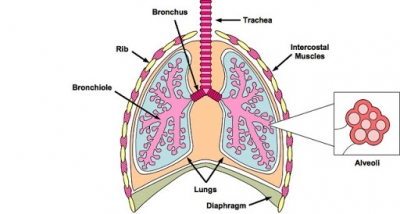
Every second of every day a life-giving process called gas exchange occurs in the lungs. During gas exchange, oxygen enters the bloodstream and carbon dioxide – a waste product – leaves.
The lining of stretchy air pockets called alveoli. Red blood cells flow through tiny blood vessels that surround the alveoli. The cells pick up oxygen and carry it away in the bloodstream to the body’s tissues and organs. White blood cells work for the immune system by surrounding and destroying bacteria and other germs.
The body’s circulation is an essential link between the atmosphere, which contains oxygen, and the cells of the body, which consume oxygen. For example, the delivery of oxygen to the muscle cells throughout the body depends not only on the lungs but also on the ability of the blood to carry oxygen and on the ability of the circulation to transport blood to muscle. In addition, a small fraction of the blood pumped from the heart enters the bronchial arteries and nourishes the airways.
Picture Credit : Google




